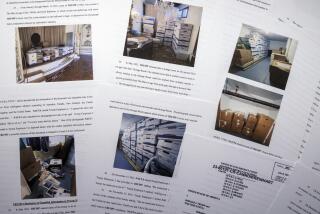Tough Case, Tough Judge
- Share via
Oliver L. North went on trial Tuesday, as scheduled, despite pleas from his conservative supporters for a presidential pardon and predictions from still others that his lawyers would devise some clever way to sabotage the case at the last minute. The credit for staying the course belongs to U.S. District Judge Gerhard A. Gesell, who has prodded both the prosecutors and defense lawyers to conclude their pretrial skirmishes, screened 40,000 pages of classified documents and deflected a possible constitutional confrontation over North’s attempts to subpoena former President Ronald Reagan and President Bush.
Gesell’s handling of North’s requests for the two Chief Executives’ testimony illustrates why he has developed a reputation as a tough-minded judge who can try the most difficult cases. Instead of reviewing two centuries of American history and launching an inquiry into executive privilege, the subject of many learned treatises, Gesell simply examined closely North’s justifications for hauling two Presidents into court and found those arguments wanting. North’s defense team never established, Gesell said, that Bush had “any specific information relevant and material” to the case. Gesell’s ruling conformed with the Supreme Court precedent most directly on point, the 1974 decision commanding former President Richard M. Nixon to surrender his Watergate tapes because they were “relevant and material” to the prosecution of several former aides; North’s request couldn’t pass the “relevant and material” test.
As for Reagan, Gesell’s ruling was equally deft. The judge was skeptical of what he called North’s “very broad undifferentiated claim” that the former President knew of North’s attempt to finance the secret war in Nicaragua with the proceeds of arms sales to Iran. The conspiracy and theft charges against North, those that dealt directly with the Iran-Contra scandal, already have been dismissed, Gesell noted; Reagan’s views of the remaining charges, revolving around North’s attempts to cover up his acts, seem “irrelevant and immaterial,” the judge said in refusing to issue the subpoena. He left open the possibility, however, that during the trial North might demonstrate that Reagan also knew whether his former aide was making false statements to Congress, shredding documents and obstructing justice--the thrust of the 12 remaining charges. In that case, Gesell said, he would reconsider the request fora subpoena and hear all the constitutional arguments about executive privilege, including the debate over how much protection to accord a former President. Anything but confrontational, Gesell noted that so far Reagan has cooperated fully with the court.
North’s attorneys and his many supporters have done their best to depict Gesell as a prosecution-minded judge determined to railroad the man whom Reagan once called “an American hero.” Only last Friday, North’s chief counsel, Brendan V. Sullivan Jr., shouted at Gesell that he was biased against the defendant. Gesell’s offense? He had noted, in the mildest fashion, that Sullivan was talking to co-counsel while the judge outlined jury-selection procedures.
In fact, Gesell has been scrupulously evenhanded. Over the prosecutors’ objections, for example, he ordered separate trials for North and his three co-defendants and refused to purge all identifying details from the classified documents that both sides wanted to introduce as evidence; the latter ruling forced the dismissal of the conspiracy and theft counts. On occasion Gesell has accused North and his lawyers of trying to obstruct the trial, but he also has chided Independent Counsel Lawrence E. Walsh for dragging his feet. Some appellate court someday may find that Gesell committed some reversible error along the way, but in our book he deserves commendation for bringing this case to trial at all.
More to Read
Sign up for Essential California
The most important California stories and recommendations in your inbox every morning.
You may occasionally receive promotional content from the Los Angeles Times.













